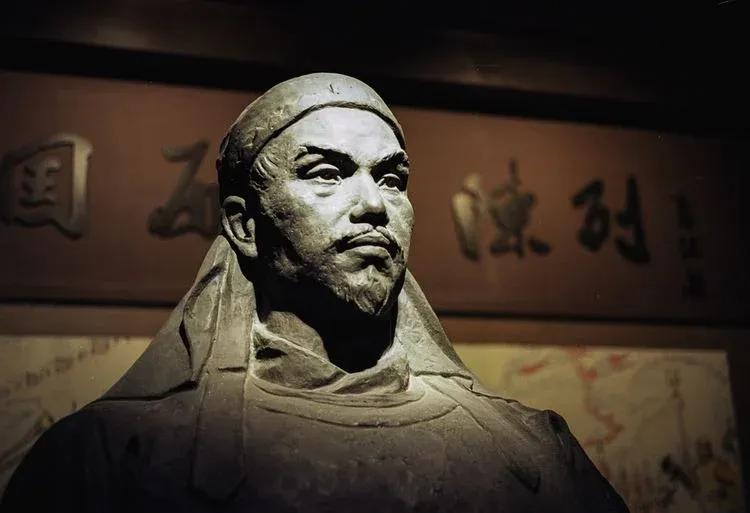Hong Xiuquan: Jesus' Brother?
Hong founded the 'God Worshipping Society' calling himself the 'Heavenly King' and was the inspiration behind the Chinese Communist Party.

Key words
- Theology: the study of religion and religious belief, or a set of beliefs about a particular religion
He studied theology at university.
- Rid: to remove or throw away something unwanted
I used weedkiller to get rid of the weeds in the garden.
- Utopian: relating to or aiming for a perfect society in which everyone works well with each other and is happy
Many wars start as a utopian vision.
- Creed: a set of beliefs that influences the way you live
The community's creed was based on the teachings of the local spiritual leader.
- Authoritarian: demanding that people obey completely and refusing to allow them freedom to act as they wish
Nobody wants to live in an authoritarian country.
Read the article to find the answers
- What was Hong Xiuquan's translation of the Bible called?
- How did Hong Xiuquan present his Bible to his followers?
- Who modelled themselves on Hong Xiuquan?
- Why did the CCP highlight the role of Hong Rengan in the Taiping movement?
Hong Xiuquan
Hong Xiuquan studied Bible translation with an American missionary and in 1847 began his own translation of the Bible, which became known as the Taiping Bible. He changed the meaning to suit his own theology and moral teachings and presented it to his followers as the authentic religion that had existed in ancient China before it was destroyed by Confucius and the imperial system.
Claiming to have had visions in which God told him to rid the world of demons and establish a heavenly kingdom on earth, he founded his own brand of Christianity called the God Worshipping Society, and declared himself to be the younger brother of Jesus Christ.
Hong became a passionate preacher, gaining followers among the poor and uneducated people of his region who were suffering from the effects of the opium trade, and soon became the leader of the Taiping Rebellion, a massive peasant uprising against the Qing Dynasty in the mid-19th century.
Under Hong's leadership, the Taiping army captured several major cities, including Nanjing, where he established a radical social and political system aimed at creating a utopian society based on the principles of equality, justice and prosperity for all. He established the Taiping Heavenly Kingdom over much of southern China, with himself as its "Heavenly King". The Taiping creed combined Christianity with a form of primitive communism that aimed to rid China of Confucianism and traditional religion, promising equality and communal land ownership, echoing the message of Marxism.
Like all Communist regimes, Hong ordered the execution of thousands of people, including his own family members and followers, who he suspected of being disloyal or opposed to his authoritarian policies. With the support of Western powers, the Qing dynasty crushed the Taiping Rebellion in 1866.
Hong Xiuquan and the CCP
Although the Taiping Rebellion failed, it inspired later revolutionary movements such as those of Sun Yat-sen and the Chinese Communist Party (CCP). During the period of civil war and revolution in China, both the Nationalists and the Communists looked to Hong as a model for their revolutionary movements.
Sun Yat-sen, the "Father of the Nation" who was responsible for the eventual overthrow of the Qing Dynasty and the end of 2,000 years of dynastic rule in China, referred to himself as "Hong Xiuquan the Second". The CCP also greatly admired Hong Xiuquan. Mao Zedong modelled himself on the "Heavenly King" and saw the Taiping Rebellion as a legitimate peasant uprising and a precursor to the CCP's own revolution.
Hong Rengan
Over time, Hong Xiuquan's cousin and fellow revolutionary, Hong Rengan, became a more attractive historical figure for the CCP to highlight, as he represented the saner side of the Taiping movement compared to the insanity of Hong Xiuquan.
Hong Rengan had received a Western education during his time in Hong Kong and was popular with Western leaders. While serving as an ambassador for the Taiping Heavenly Kingdom, he led efforts to modernise and reform the regime by introducing Western ideas of government and religion into the Taiping movement.
Discussion questions
- Do you have any questions about any of the vocabulary or grammar in this article?
- What do you know about the history of Christianity in China?
- What do you think about Hong Xiuquan's rise to power through the Taiping Rebellion and the establishment of the Taiping Heavenly Kingdom?
- Would you believe someone who told you they had visions and messages from God?
- Do you model yourself on anyone?






